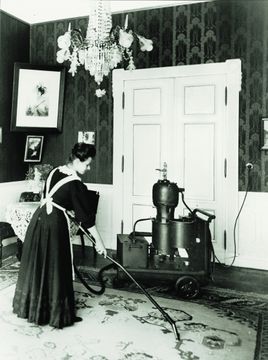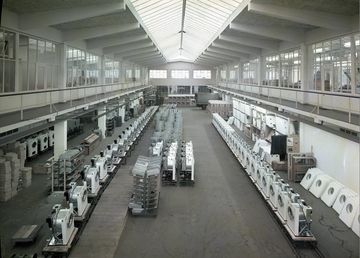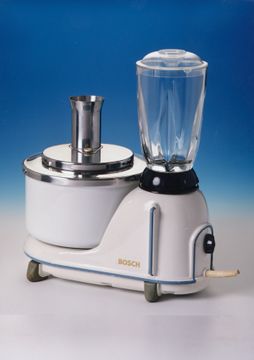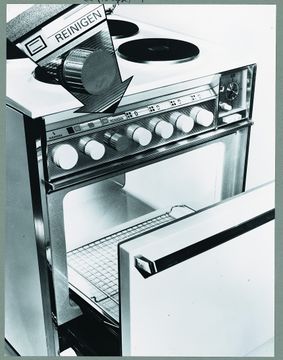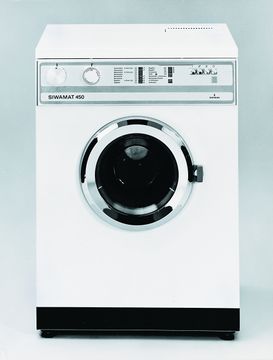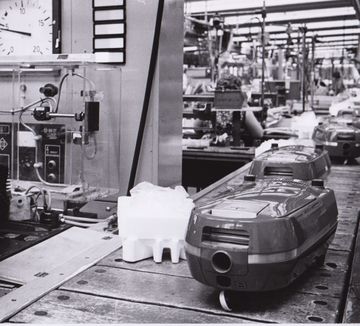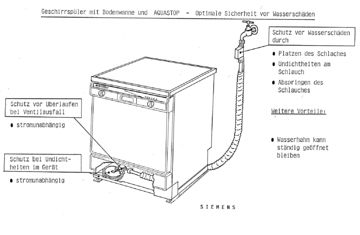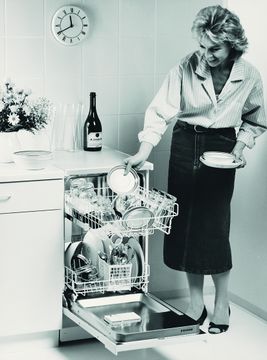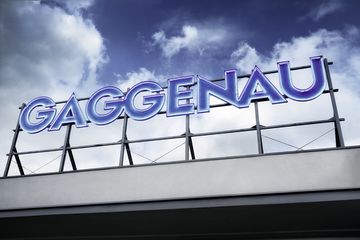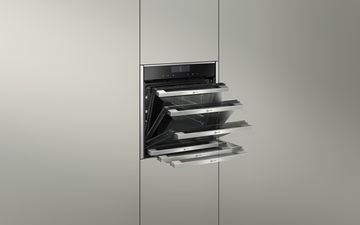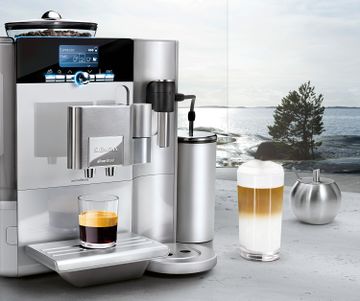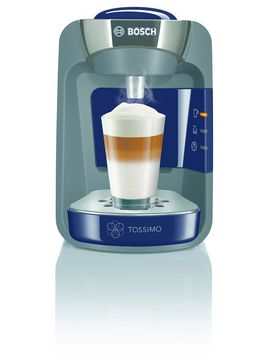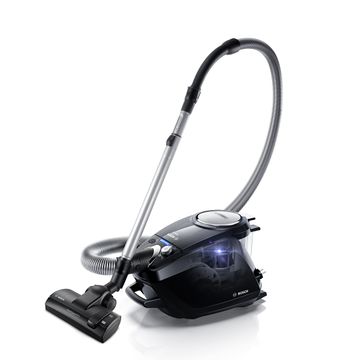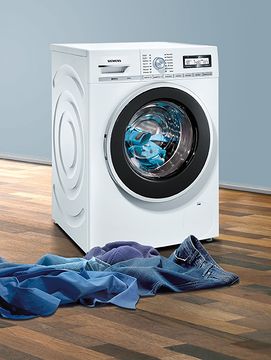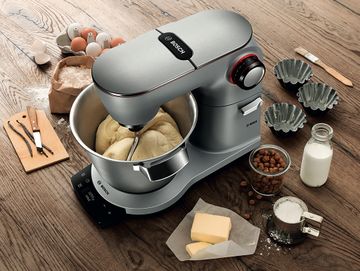Milestones of Success: Difference between revisions
No edit summary |
No edit summary |
||
| Line 6: | Line 6: | ||
File: Foto 02 1956 ca Constructa Werkhalle.jpg|''Constructa factory hall, around 1956.'' <br> <br> '''Keeping an eye on the laundry''' <br> In 1951, Constructa introduced the first fully automatic washing machine to the market. Designed by Peter Pfenningsberg, its most prominent feature was its porthole. By 1955, its successor model, the Constructa Deluxe 100, already had an 80 percent market share – and this in competition with 30 other suppliers. <br> <br> | File: Foto 02 1956 ca Constructa Werkhalle.jpg|''Constructa factory hall, around 1956.'' <br> <br> '''Keeping an eye on the laundry''' <br> In 1951, Constructa introduced the first fully automatic washing machine to the market. Designed by Peter Pfenningsberg, its most prominent feature was its porthole. By 1955, its successor model, the Constructa Deluxe 100, already had an 80 percent market share – and this in competition with 30 other suppliers. <br> <br> | ||
File: Foto 03 1952 Universal Kuechenmaschine.jpg|''1952 The Bosch food processor Neuzeit I (“Modern Times I”)'' <br> <br> '''All-rounder in the kitchen''' <br> In 1952, Bosch launched its first electrically operated universal food processor, the Neuzeit I. <br> <br> | File: Foto 03 1952 Universal Kuechenmaschine.jpg|''1952 The Bosch food processor Neuzeit I (“Modern Times I”)'' <br> <br> '''All-rounder in the kitchen''' <br> In 1952, Bosch launched its first electrically operated universal food processor, the Neuzeit I. <br> <br> | ||
File: Foto 04 1972 Meisterkoch HL 7470.jpg|''From 1970 The Siemens Meisterkoch (Master Chef) series'' <br> <br> ''' A stove for master chefs ''' <br> In 1970, Siemens | File: Foto 04 1972 Meisterkoch HL 7470.jpg|''From 1970 The Siemens Meisterkoch (Master Chef) series'' <br> <br> ''' A stove for master chefs ''' <br> In 1970, Siemens introduced the Meisterkoch series, which blew the market away with an outstanding range of operations and flexible function. In 1981, the Meisterkoch universal stove was launched. This was a built-in cooker that owed its success to a combination of top and bottom heating, convection, grill, microwave and self-cleaning by pyrolysis. An oven carriage facilitated access to baked goods. <br> <br> | ||
File: 1970.jpg|''1970 Neff Circo Therm'' <br> <br> '''A lot of hot air''' <br> This multifunction oven with its CircoTherm hot air system and glass front provides insight in the kitchen. CircoTherm still stands for high-quality Neff ovens to this day. <br> <br> | File: 1970.jpg|''1970 Neff Circo Therm'' <br> <br> '''A lot of hot air''' <br> This multifunction oven with its CircoTherm hot air system and glass front provides insight in the kitchen. CircoTherm still stands for high-quality Neff ovens to this day. <br> <br> | ||
File: Foto 05 01 1970 SIWAMAT 450.jpg|''1972 Fully automatic washing machines and dryers'' <br> <br> '''Washing machines learn to dry''' <br> The successful SIWAMAT series | File: Foto 05 01 1970 SIWAMAT 450.jpg|''1972 Fully automatic washing machines and dryers'' <br> <br> '''Washing machines learn to dry''' <br> The successful SIWAMAT series continued to grow throughout the 1970s. In 1970, the SIWAMAT 450 automatic washing machine with its numerous programs and functions was added to the premium class. This was followed by the appearance of the first automatic washer-dryer in 1972. The front loaders SIWAMAT V472 with 800 rpm and the SIWAMAT 484 with 1000 rpm appeared in 1979. At the beginning of the 1980s, the first fully electronic washing machine, the SIWAMAT 870 electronic, selected the most economical program itself and displayed the progress of the washing process. <br> <br> | ||
File: 1985 ca Bad Neustadt Staubsaugerfertigung Siemens.jpg|''1981 Siemens vacuum cleaners'' <br> <br> '''The vacuum cleaner becomes a design icon''' <br> The Siemens VS 5 standard vacuum cleaner has a production output of more than four million. This is followed in 1984 by the Siemens Black Energy, which soon attains cult status with its sophisticated design. <br> <br> | File: 1985 ca Bad Neustadt Staubsaugerfertigung Siemens.jpg|''1981 Siemens vacuum cleaners'' <br> <br> '''The vacuum cleaner becomes a design icon''' <br> The Siemens VS 5 standard vacuum cleaner has a production output of more than four million. This is followed in 1984 by the Siemens Black Energy, which soon attains cult status with its sophisticated design. <br> <br> | ||
File: 1985 aquastop Siemens.jpg|''1985 AquaStop'' <br> <br> '''Goodbye to overflowing''' <br> AquaStop technology offers 100% protection against water damage caused by washing machines. The patent application is lodged in 1982, with the technology introduced in 1985, for example in the Constructa CONTURA and the Bosch SMS 9022. AquaStop is a pioneering success. In its first year, sales figures exceed production capacity. AquaStop has been a standard in washing machines since 1986 – even among its competitors. <br> <br> | File: 1985 aquastop Siemens.jpg|''1985 AquaStop'' <br> <br> '''Goodbye to overflowing''' <br> AquaStop technology offers 100% protection against water damage caused by washing machines. The patent application is lodged in 1982, with the technology introduced in 1985, for example in the Constructa CONTURA and the Bosch SMS 9022. AquaStop is a pioneering success. In its first year, sales figures exceed production capacity. AquaStop has been a standard in washing machines since 1986 – even among its competitors. <br> <br> | ||
Revision as of 11:36, 15 February 2017
BSH and its predecessor brands have always been characterized by technical innovations. The first electric vacuum cleaners, refrigerators and modern automatic washing machines were technological milestones on the company’s road to success. Every time something new happened in the field of home appliances, the BSH brands were right there at the cutting edge. And through it all, the focus has always been on one clear objective – making the lives of people, especially housewives, easier. Modern appliances provided time and energy for other things than housework. BSH home appliances became a driving force for not only technical but also social development, and have remained so to this day. An overview.
- Foto 01 02 1933 Kuehlschrank Schaufenster.jpg
1933 Bosch refrigerator
The first refrigerator: a round affair
In 1933, Bosch introduced the first electric refrigerator. It had a round shape and a capacity of 60 liters, and sold for 365 Reichsmark.
Constructa factory hall, around 1956.
Keeping an eye on the laundry
In 1951, Constructa introduced the first fully automatic washing machine to the market. Designed by Peter Pfenningsberg, its most prominent feature was its porthole. By 1955, its successor model, the Constructa Deluxe 100, already had an 80 percent market share – and this in competition with 30 other suppliers.
From 1970 The Siemens Meisterkoch (Master Chef) series
A stove for master chefs
In 1970, Siemens introduced the Meisterkoch series, which blew the market away with an outstanding range of operations and flexible function. In 1981, the Meisterkoch universal stove was launched. This was a built-in cooker that owed its success to a combination of top and bottom heating, convection, grill, microwave and self-cleaning by pyrolysis. An oven carriage facilitated access to baked goods.
- 1970.jpg
1970 Neff Circo Therm
A lot of hot air
This multifunction oven with its CircoTherm hot air system and glass front provides insight in the kitchen. CircoTherm still stands for high-quality Neff ovens to this day.
1972 Fully automatic washing machines and dryers
Washing machines learn to dry
The successful SIWAMAT series continued to grow throughout the 1970s. In 1970, the SIWAMAT 450 automatic washing machine with its numerous programs and functions was added to the premium class. This was followed by the appearance of the first automatic washer-dryer in 1972. The front loaders SIWAMAT V472 with 800 rpm and the SIWAMAT 484 with 1000 rpm appeared in 1979. At the beginning of the 1980s, the first fully electronic washing machine, the SIWAMAT 870 electronic, selected the most economical program itself and displayed the progress of the washing process.
1985 AquaStop
Goodbye to overflowing
AquaStop technology offers 100% protection against water damage caused by washing machines. The patent application is lodged in 1982, with the technology introduced in 1985, for example in the Constructa CONTURA and the Bosch SMS 9022. AquaStop is a pioneering success. In its first year, sales figures exceed production capacity. AquaStop has been a standard in washing machines since 1986 – even among its competitors.
- EB 333 Gaggenau EuroCucina 2016.jpg
1986 The Gaggenau EB 300 oven
Full width for roasting
The first 90 cm-wide oven on the European market has a large effective volume of 87 liters and provides space for up to four roasts. The EB 300 becomes an icon. In 2016, the year of its 333rd anniversary, Gaggenau launches the EB 333 as homage to the EB 300. This updated version appears in a more modernized form and functionality, while remaining true to its origins. A distinctive feature is the stainless steel door that reaches across the entire width of the oven.
- 1987.jpg
1987 CLOU
The Clou
The smoothly operating, ball-bearing CLOU from Neff, a tilt-proof, multi-level telescopic oven shelf rail, is launched in 1987.
- 1993.jpg
1993 Constructa viva washing machine
Fuzzy controls the laundry
The BSH subsidiary Constructa sets new standards for washing machines. Equipped with the fuzzy control system, sensors detect the fill quantity of the machine and can thereby adapt the washing time and spin cycle to the laundry. This technology makes it possible to reduce water and electricity consumption by approximately 50 percent.
- 1993.jpg
1993 CFC-free refrigerators
Clean cooling
Sustainable thinking: BSH converts its European production to CFC-free refrigerators and from 1994 also bans any use of CFCs in European BSH refrigerators.
- 2002.jpg
2002 New designs for controls
Quicker switching
Innovative concepts such as TouchControl and slider technology simplify handling and facilitate intuitive operation. In 2003, Neff develops the TwistPad, a detachable magnetic one-button control for stoves that is elegant, safe and easy to clean.
- 2004.jpg
2004 Bosch AquaVario
The smart dishwasher
With AquaVario technology, sensors detect the right water pressure and new cleaning agents. These innovative characteristics make BSH the market leader in dishwashers. New operating concepts such as TouchControl and InfoLight are also introduced.
- 2006.jpg
2006 VarioSpeed dishwashers
Dishwashers “on” speed
Dishwashers are now available with VarioSpeed technology. Full performance at double the speed saves time.
- 2008.jpg
2008 Dishwashers with a zeolite drying system
A world first in energy efficiency
Dishwashers with a zeolite drying system are the most economical yet. This world first makes use of the natural mineral zeolite’s ability for storing moisture and ensures low energy consumption.
2008 The Tassimo series
Compact multiple beverage machine
The introduction of the Tassimo series revolutionizes coffee brewing with the multiple beverage machines and its so-called T DISCs. The Bosch Tassimo is manufactured in cooperation with the partner Kraft Foods. It not only has the shortest heat-up times, but is also the best energy-saving and most compact appliance on the market.
2010 i-DOS dosing system
Properly dosed washing
The automatic i-DOS dosing system allows for to-the-milliliter accurate dosing of detergent and thus reduces water consumption. The new technology is available, for example, in the Siemens iQ 800 premium washing machine. From 2011 onwards, it also comes with Home Connect and easy operation by app – from anywhere.
- 2011.jpg
2011 Full-surface induction hob with TFT Touch Display
New standards in user-friendliness
New freedom in the kitchen – a single large cooking surface with full-surface induction allows for pots and pans to be placed anywhere. In addition, the TFT touch display shows the shape, size and position of the cookware.
- 2013.jpg
2013 Bosch Athlet hand-held vacuum cleaner
Cordless power pack
The cordless hand-held vacuum cleaner can reach any place where there is dust – no matter where the sockets are. Thanks to its lithium-ion technology, the Athlet has just as much suction power as a conventional Bosch vacuum cleaner.
- 2015.jpg
2015 Cleaning system for the Gaggenau 400 series
Ovens are cleaning themselves
As an exclusive world first, Gaggenau presents a fully automatic cleaning system for all 400 series steam ovens with a direct connection to the water supply. The steam chamber is cleaned hygienically with a cleaning cartridge and water.
2016 Bosch OptiMUM food processor
The culmination of many years of experience
Functionality, user-friendliness and design – Bosch pours all of its 60 years of experience in food processors into the design of the OptiMUM. With an integrated scale, timer and advanced sensor technology, it takes on more tasks than any Bosch food processor has ever managed before – and thanks to its automatic programs, it does all of this independently.
